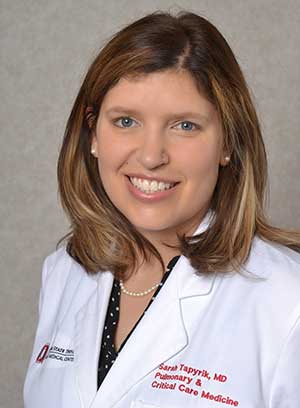COVID-19 and the Impact on Junior Medical Students
By: Sarah Tapyrik, MD, FCCP
October 26, 2020
While the COVID-19 pandemic has changed life for everyone in the past 8 months, it has had a distinctive impact on medical students who are still in their early years of training. I serve as a coach for a small group of medical students who were just about to transition into their third year of medical school and clinical rotations at the onset of the pandemic.
Everything in our area shut down, including testing sites for the USMLE Step 1 exam. The USMLE causes a great deal of stress for students, as we all likely remember, and my students had prepared meticulously for the exam. Between the exam being postponed indefinitely and an indeterminate start of clinical rotations, my students faced an unsettling uncertainty in their medical school futures.
As life started to “open” back up after the initial peak in COVID cases, my students eventually got to take their exams and start their clinical rotations. However, all of their prior diligent planning for the “perfect” schedule of third-year rotations was significantly impacted. Their initial block of rotations started late with a truncated schedule. They were able to see patients, but only those who had tested negative for COVID-19, making certain rotations, such as Emergency Medicine, much more difficult due to the varying lag time in availability of test results.
One of the most challenging and exceptional aspects of all of this is that these students have worked through it without the benefit of “how-to” advice from more advanced medical students. So much of navigating your way through medical school comes from the experience and advice from those who have recently gone through it and are now in the classes above you. But thanks to a once-in-a-lifetime pandemic, it was no longer available in the same way to these junior medical students. There was so much incomparable change in their program that they didn’t really have anyone to turn to for the specific, direct advice on which they had learned to rely.
To make the best of the situation, we made sure all of the students had ample access to faculty, counselors, and coaches. We listened, provided support, and worked through new situations together. Some of the students were able to make changes in their schedules to accommodate new dates for USMLE exams or move a rotation to a different location in order to preserve some of the experience they had hoped for. The students continue to have a lot of questions—about grades for shortened rotations, how this will affect their residency applications, and if they will also have to do residency interviews via video as their fourth-year student colleagues will be doing in the next couple of months. There aren’t answers yet for a lot of their questions, but we plan to address these issues and questions as we are able.
As we have seen happen in so many places during this pandemic, my students rose to the occasion and met their new challenges head-on. They used their endless hours of “stay-at-home” time not only to maintain their knowledge for the USMLE, but also to volunteer to get groceries and help with child care for our frontline health-care workers. They learned to navigate inpatient wards and join medical teams while not being able to see many of the patients personally. They have shown endless patience in the outpatient setting. Due to minimal in-person patient visits, they have worked to add value to patient care via telemedicine, by making sure the call is initiated on time and by spending additional time with the patient, often being an extra ear to listen to patient fears and concerns about life during the pandemic.
I’m proud of my students and how they have navigated the pandemic thus far. They are not frontline workers (yet), nor were they far enough along in their education to start their intern years early, as some more senior medical students in other states were called to do. But my students had their own unique stressors and handled them admirably. I have no doubt that this will add to their resilience and problem-solving abilities moving forward. I feel an extra connection to this group due to this unprecedented event in our lives, and I’m so excited to continue to follow and support them while watching their remarkable paths toward their careers unfold in an ever-changing world of medicine.

Sarah Tapyrik, MD, FCCP, is an Assistant Professor of Pulmonary and Critical Care Medicine and the Medical Director of Respiratory Therapy at The Ohio State University Wexner Medical Center in Columbus, Ohio. Dr. Tapyrik serves as a portfolio coach and mentor for medical students and supports the fellowship program by mentoring fellows and precepting them in the pulmonary clinic. She is a member of CHEST’s Training and Transitions Committee. Her clinical interest is general pulmonary medicine with more specific interests in nontuberculous mycobacterial disease and bronchiectasis.